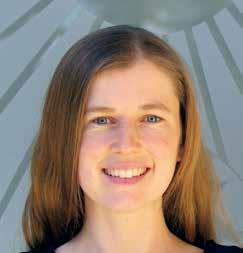Breadcrumb

Environmental Resources Engineering, B.S. | Class of
Meg Harper
Research Engineer
Employer: Schatz Energy Research Center
Job description: In addition to conducting research into mini-grids, my work over the past four years has largely involved supporting Lighting Global, a World Bank Group program designed to advance the off-grid solar market. Since 2009, SERC has developed and managed the quality assurance program for Lighting Global. As part of this effort we have designed test methods and tested hundreds of LED lights and solar home system kits, managed a network of test labs across the world, and conducted research on consumer preference, after-sales service, and market presence of solar products in Kenya, Tanzania, and India. This effort has not only allowed me to work with an incredible team here at SERC, but also provided me the opportunity to travel and engage with people all over the world.
About Meg
How did this program prepare you for your job?
These international experiences and my classroom studies provided me with the skills necessary to work with a team of engineering students and advisors on the development and field testing of a load-sharing technology for micro-hydroelectric mini-grids in Bhutan. This student-run effort grew out of a RESU design project which won funding through the US EPA’s People, Prosperity and the Planet (P3) student design competition (www.epa. gov/P3). While the project revolved around improving the reliability of a single mini-grid in Bhutan, the experience reinforced my desire to help improve people’s access to renewable electricity.
What would you say to prospective students who are thinking about applying to this program?
No matter what your interests, I highly recommend getting involved in campus groups and seeking internships or relevant job opportunities to help enhance your experience at HSU and help you put the information you learn in the classroom into context. And, if you are interested in renewable energy, keep your eyes out for SERC announcements about student job opportunities and docent positions. We’ll post them around campus, or you can check the SERC website here: www. schatzlab.org/news/category/positions/
I came to the Energy, Technology and Policy (ETAP) program at HSU with the desire to focus on the development of renewable energy technologies, energy efficiency, and sound energy policy as ways to address our carbon emissions. After looking at all of the engineering design courses I wanted to take (and all the pre-requisites I would need to be able to take them!), I was inspired to simultaneously gain a strong technical background by pursuing a second bachelor’s degree in the ERE program.
At HSU I worked on a myriad of group projects, both in the classroom and through my experience with campus groups such as the Renewable Energy Student Union (RESU) and the Humboldt Energy Independence Fund (HEIF). Additionally, I applied for and received a research fellowship with the Schatz Energy Research Center (SERC), which enabled me to work on topics ranging from energy efficiency policy to hydrogen infrastructure. All of these projects gave me a chance to work with some of my amazing fellow students in the ERE program, and staff at SERC let me put what I learned in the classroom into action.
My interest in renewable energy encouraged me to spend my summers pursuing a complimentary passion: working on appropriate technology design projects throughout the world. One key experience was attending the International Development Design Summit (IDDS) in Kumasi, Ghana. This month-long summit brought together people from all over the world, all sharing a desire to create technologies that address the needs of communities in the poorest regions of the world. (Several IDDS summits are hosted in different countries each summer; you can apply on the IDIN website: www.idin.org/idds).
These international experiences and my classroom studies provided me with the skills necessary to work with a team of engineering students and advisors on the development and field testing of a load-sharing technology for micro-hydroelectric mini-grids in Bhutan. This student-run effort grew out of a RESU design project which won funding through the US EPA’s People, Prosperity and the Planet (P3) student design competition (www.epa. gov/P3). While the project revolved around improving the reliability of a single mini-grid in Bhutan, the experience reinforced my desire to help improve people’s access to renewable electricity.
After graduation, I was offered the chance to continue working at SERC on issues related to off-grid energy access. In addition to conducting research into mini-grids, my work over the past four years has largely involved supporting Lighting Global, a World Bank Group program designed to advance the off-grid solar market. Since 2009, SERC has developed and managed the quality assurance program for Lighting Global. As part of this effort we have designed test methods and tested hundreds of LED lights and solar home system kits, managed a network of test labs across the world, and conducted research on consumer preference, after-sales service, and market presence of solar products in Kenya, Tanzania, and India. This effort has not only allowed me to work with an incredible team here at SERC, but also provided me the opportunity to travel and engage with people all over the world.
No matter what your interests, I highly recommend getting involved in campus groups and seeking internships or relevant job opportunities to help enhance your experience at HSU and help you put the information you learn in the classroom into context. And, if you are interested in renewable energy, keep your eyes out for SERC announcements about student job opportunities and docent positions. We’ll post them around campus, or you can check the SERC website here: www. schatzlab.org/news/category/positions/





